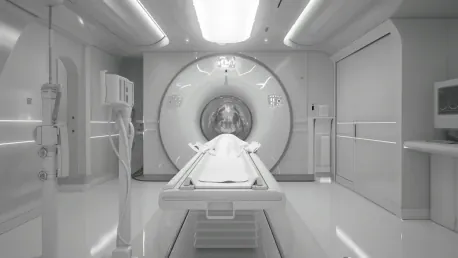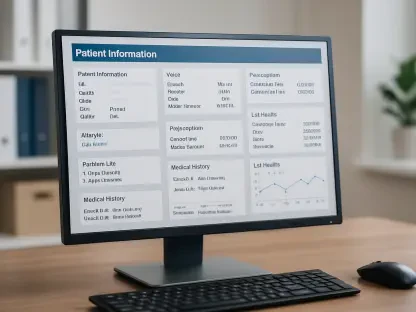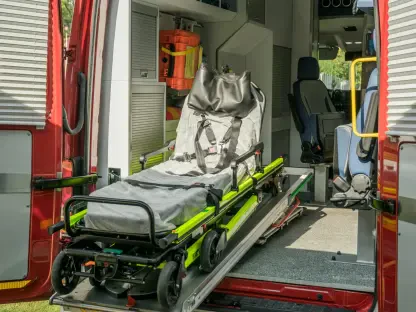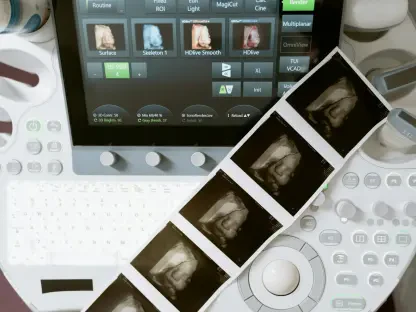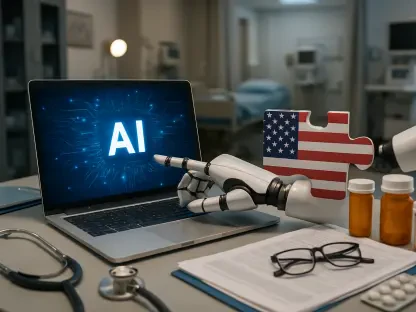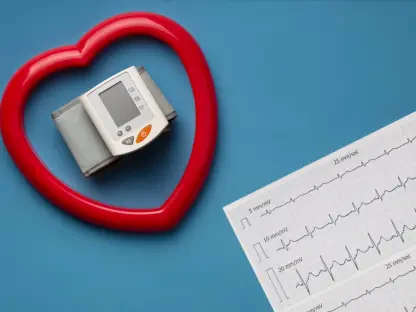Artificial intelligence is making waves across various industries, with healthcare standing to gain immensely from its advancements. Enter Harrison.ai, an Australian startup that has turned its innovative sights on radiology and pathology. Their latest contribution, Harrison.rad.1, aims to transform how radiologists interpret medical images, ultimately enhancing diagnostic accuracy and efficiency. With this innovation, Harrison.ai is set to change the landscape of medical diagnostics in significant ways, promising to alleviate the burden on medical professionals and improve patient outcomes worldwide.
Introducing Harrison.rad.1
A Vision Language Model Tailored for Radiology
Harrison.rad.1 isn’t just another AI model; it’s a foundational vision language model specifically engineered for the complex needs of radiology. Unlike more generic AI solutions, this model excels in interpreting medical images through a dialogue-based interface, capable of answering intricate visual questions, identifying findings, and generating comprehensive reports. Understanding a patient’s clinical history and context, it synthesizes this data to produce accurate and actionable insights. This sophisticated approach to medical image analysis sets Harrison.rad.1 apart, enabling it to deliver high levels of precision and speed in diagnostic tasks.
Moreover, the model’s ability to provide detailed visual analyses means it can support radiologists in making more informed decisions. This feature is crucial in complex cases where comprehensive evaluations are necessary. By simulating a dialogue with the radiologist, Harrison.rad.1 can highlight specific areas of interest, discuss potential diagnoses, and recommend further investigations, thus functioning as a highly intelligent and supportive assistant. This capability is especially beneficial in environments where radiologists face heavy workloads and need to process large volumes of images quickly and accurately.
Bridging Human Expertise and AI Excellence
Harrison.rad.1 was rigorously tested and benchmarked against seasoned radiologists. In the highly challenging Fellowship of the Royal College of Radiologists (FRCR) 2B Rapids examination, the model scored an impressive 51.4 out of 60. This performance equates to that of human experts and stands in stark contrast to other leading AI models, like OpenAI’s GPT-4 and Anthropic’s Claude-3.5-sonnet, which scored below 30. These results underscore the model’s capacity to operate at a professional level, reinforcing its potential to be integrated seamlessly into clinical settings.
The ability of Harrison.rad.1 to achieve such impressive scores is a testament to its advanced design and sophisticated algorithms. It demonstrates that AI can reach, and even surpass, human expertise in specific diagnostic tasks when adequately trained and fine-tuned. By matching the performance of experienced radiologists, Harrison.rad.1 not only provides confidence in its diagnostic capabilities but also raises the bar for what AI can achieve in the medical field. This blending of human expertise and artificial intelligence excellence is pivotal for the future of medical diagnostics, setting a new standard for AI-assisted healthcare.
The Engine Behind the Model
Proprietary Training Data: The Key to Success
The secret sauce behind Harrison.rad.1’s success lies in its training data. The model was developed using an extensive and proprietary dataset comprising millions of real-world images, radiology studies, and reports. This data was meticulously annotated by a team of medical specialists to ensure high-quality training signals. This rich dataset offers a distinct advantage over more generalized models that often rely on open-source data. Harrison.ai’s proprietary data, specifically designed for radiology, ensures the model learns from the most relevant and clinically accurate information available.
This detailed and comprehensive dataset enables Harrison.rad.1 to recognize and interpret subtle patterns and anomalies in medical images that might be missed by less sophisticated models. The diverse range of images and case studies included in the dataset allows the AI to generalize its knowledge to a wide variety of diagnostic scenarios. This rigorous training process not only equips the model with the proficiency to handle standard cases but also prepares it to manage rare and complex conditions with a high degree of accuracy. The emphasis on quality and relevance in the training data is a significant factor in the model’s overall effectiveness and reliability.
Collaboration and Annotation for Precision
Harrison.ai’s collaborative approach ensures their models are second to none. By involving a large team of radiologists and medical specialists in the annotation process, they have created a model that not only learns from vast amounts of data but does so with clinical precision. This exhaustive process remains a cornerstone of Harrison.ai’s commitment to delivering reliable and clinically useful AI tools. Each image and report in the training set is scrutinized and annotated with detailed notes and insights from medical professionals, providing the AI with a nuanced understanding of medical diagnostics.
This collaboration between AI developers and medical experts is crucial for creating a model that clinicians can trust and rely on in their day-to-day work. By embedding the expertise of seasoned professionals into the AI’s learning process, Harrison.ai ensures that the model’s outputs are not only accurate but also aligned with standard clinical practices. This symbiotic relationship between technology and human insight enables Harrison.rad.1 to function as a true extension of the radiologist’s capabilities, enhancing rather than replacing the critical human touch in medical diagnostics.
Demonstrating the Capabilities
Real-world Applications and Case Studies
In practical demonstrations, Harrison.rad.1 has showcased its ability to interpret chest X-rays with incredible accuracy and speed. During one notable demo, the model identified a mass in the left lung of a patient and flagged it as an urgent case. This kind of quick, accurate prioritization can be life-saving, reducing the time doctors spend on routine reviews and helping them focus on critical cases. These demonstrations highlight the model’s potential to streamline radiology workflows and improve patient care by ensuring that serious conditions are identified and addressed promptly.
The capacity to swiftly and accurately analyze medical images means that Harrison.rad.1 can significantly reduce the diagnostic times for patients, allowing for faster intervention and treatment. This efficiency is particularly important in emergency settings where time is of the essence. By automating the initial review of images, the model frees up radiologists to focus on more complex cases that require their expert judgment. This balance of human expertise and AI efficiency creates a more effective and responsive healthcare system, ultimately benefiting patients through quicker and more accurate diagnoses.
Speed and Accuracy in Diagnostics
Harrison.rad.1’s capabilities translate directly into operational efficiency. By automating the interpretation process, the model frees up valuable time for radiologists, allowing them to concentrate on cases that require more nuanced human judgment. This efficiency is especially crucial in settings with high patient volumes or limited medical personnel, making a significant impact on overall healthcare delivery. The ability to quickly process large numbers of images ensures that radiologists can manage their workloads more effectively, reducing burnout and enhancing job satisfaction.
Furthermore, the model’s accuracy in identifying and prioritizing critical findings can improve patient outcomes by ensuring that the most urgent cases are addressed first. This prioritization is vital in healthcare environments where resource allocation and timely intervention are critical. Harrison.rad.1’s role in expediting the diagnostic process can lead to earlier detection of diseases, more prompt treatments, and ultimately better patient prognosis. This blend of speed and precision makes the model a valuable asset in modern medical practice, enhancing both efficiency and quality of care.
Expanding Global Healthcare Capacity
Addressing the Shortage of Specialists
One of the core missions of Harrison.ai is to expand global healthcare capacity. With a noted shortage of radiologists and pathologists worldwide, the implementation of AI like Harrison.rad.1 can alleviate this pressure. By taking over repetitive and time-consuming tasks, AI allows doctors to leverage their skills where they are most needed, enhancing overall diagnostic capacity. This capability is particularly valuable in underserved regions where access to specialized medical professionals is limited. By providing reliable and accurate diagnostic support, Harrison.rad.1 can help bridge the gap in healthcare services.
The use of AI in diagnosing medical images also means that healthcare providers can extend their reach to remote and rural areas, providing high-quality diagnostic services to communities that may otherwise lack access. This extension of services can significantly improve healthcare equity, ensuring that all patients receive the care they need regardless of their geographical location. By addressing the workforce shortage and improving access to diagnostic services, Harrison.ai’s technology has the potential to transform healthcare delivery on a global scale.
Enhancing Availability and Access
Harrison.ai’s tools like Annalise.ai are already making a difference in over 40 countries, having secured clearances for clinical use in regions with stringent regulations, such as Australia and Europe. By widening the availability of their advanced diagnostic tools, Harrison.ai helps ensure more equitable access to high-quality healthcare services globally. This widespread adoption not only validates the efficacy of their AI solutions but also underscores their commitment to improving healthcare worldwide. The ability to gain regulatory approval in multiple regions speaks to the robustness and reliability of Harrison.ai’s models.
The broad deployment of these tools means that patients in diverse healthcare systems can benefit from improved diagnostic accuracy and efficiency. Whether in well-resourced hospitals in metropolitan areas or understaffed clinics in remote locations, Harrison.ai’s technology can enhance the quality of care provided. By democratizing access to advanced diagnostic tools, Harrison.ai is paving the way for a more inclusive and efficient healthcare system, where high-quality diagnostics are available to all, regardless of location or resources.
Regulatory and Ethical Considerations
Navigating Regulatory Landscapes
Despite the rapid advancements in healthcare AI, different regulatory environments can either bolster or hinder their adoption. While the U.S. FDA regulations present significant challenges, Harrison.ai has successfully navigated approvals in other markets, demonstrating the viability and safety of their solutions. This ability to operate within stringent regulatory frameworks ensures that their models meet high standards for clinical use. Additionally, their experience in diverse regulatory environments equips them with the knowledge and expertise to manage the complexities of introducing new AI technologies into healthcare systems worldwide.
The regulatory landscape is crucial for the safe and effective deployment of AI in clinical settings. By adhering to rigorous standards and obtaining necessary approvals, Harrison.ai ensures that its models are not only innovative but also trustworthy and reliable. This commitment to compliance helps build confidence among healthcare providers and patients, fostering greater acceptance and use of AI in medical diagnostics. Successfully navigating these regulatory hurdles showcases Harrison.ai’s dedication to delivering high-quality, safe, and effective AI solutions for the global healthcare industry.
Commitment to Ethical AI Development
Harrison.ai understands the ethical implications of deploying AI in healthcare. Ensuring responsible development and rigorous validation of models like Harrison.rad.1 is central to their ethos. This conscientious approach not only builds trust but also aligns with broader industry standards for the ethical use of AI technologies. Ethical considerations include ensuring patient data privacy, avoiding biases in the AI’s decision-making processes, and maintaining transparency in how the models operate. Harrison.ai’s focus on these principles ensures that their technology is used in ways that benefit patients and healthcare providers alike.
By prioritizing ethical development, Harrison.ai contributes to the broader discourse on the responsible use of AI in medicine. Their commitment to transparency and accountability in AI deployment sets a benchmark for other companies in the field. This focus on ethics is crucial for gaining and maintaining the trust of the medical community and the public. It ensures that advancements in AI are implemented in a manner that respects patient rights and enhances the overall integrity of the healthcare system. Harrison.ai’s ethical framework serves as a guide for the responsible integration of AI into clinical practice.
A Look Ahead: Beyond Radiology
The Future of AI in Pathology
Harrison.ai is not stopping at radiology. They’re venturing into pathology with projects like Franklin.ai, which aims to revolutionize tissue examination for disease detection and treatment guidance. By extending their expertise to other medical fields, they envision a future where AI plays an integral role across various facets of medical diagnostics. The development of Franklin.ai exemplifies their ambition to bring the benefits of AI to a broader range of diagnostic processes, thereby enhancing the overall efficiency and accuracy of medical care.
The application of AI in pathology holds significant promise for improving disease detection and treatment planning. By analyzing tissue samples with high precision, AI can assist pathologists in diagnosing conditions more accurately and quickly. This capability is particularly valuable in oncology, where early and precise detection of cancer can greatly influence treatment outcomes. By expanding their focus to include pathology, Harrison.ai is positioning itself at the forefront of AI-driven innovations in multiple areas of healthcare, paving the way for comprehensive AI integration in medical diagnostics.
Unified Vision for Healthcare Transformation
Artificial intelligence is making a significant impact across numerous industries, and healthcare is particularly poised to benefit from these advancements. One exciting player in this transformative landscape is Harrison.ai, an innovative Australian startup focusing on radiology and pathology. Their latest development, known as Harrison.rad.1, aims to revolutionize the way radiologists analyze medical images. This groundbreaking technology promises to enhance both the accuracy and efficiency of diagnostics, ultimately improving outcomes for patients around the globe.
By integrating AI into radiology, Harrison.ai seeks to streamline the diagnostic process, making it faster and more reliable. This advancement is especially crucial given the ever-increasing volume of medical imaging data that radiologists must interpret. The pressure on healthcare professionals is immense, and the potential for human error can never be entirely eliminated. However, with the aid of Harrison.rad.1, the likelihood of diagnostic errors is significantly reduced. This technology not only assists radiologists but also lightens their workload, allowing them to focus more on patient care.
Moreover, the global implications of such an innovation are profound. As medical facilities worldwide adopt Harrison.rad.1, disparities in healthcare quality and access could be narrowed, leading to better patient care and outcomes on a larger scale. Harrison.ai’s pioneering efforts represent a monumental step forward in medical diagnostics, making the future of healthcare look increasingly promising and efficient.
